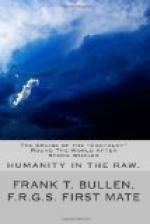The most peculiar features of these inhospitable shores to a seaman are the vast fields of seaweed surrounding them all, which certainly helps to keep the sea down during gales, but renders navigation most difficult on account of its concealment of hidden dangers. These islands are aptly named, the word “Kurile” being Kamschatkan for smoke; and whether it be regarded as given in consequence of the numerous volcanoes which pour their fumes into the air, or the all-prevailing fog fostered by the Kuro Siwo, or Japanese counterpart of the Gulf stream, the designation is equally appropriate.
We entered the Okhotsk Sea by the Nadeshda Channel, so-named after Admiral Krusenstern’s ship, which was the first civilized vessel that passed through its turbulent waters. It separates the islands Rashau and Mantaua by about twenty miles, yet so conflicting and violent are the currents which eddy and swirl in all parts of it, that without a steady, strong, fair wind it is most dangerous to a sailing vessel. Thenceforward the navigation was free from difficulty, or at least none that we could recognize as such, so we gave all our attention to the business which brought us there.
Scarcely any change was needed in our equipment, except the substitution of longer harpoons for those we had been using, and the putting away of the bomb-guns. These changes were made because the blubber of the bowhead is so thick that ordinary harpoons will not penetrate beyond it to the muscle, which, unless they do, renders them liable to draw, upon a heavy strain. As for the bombs, Yankees hold the mysticetae in such supreme contempt that none of them would dream of wasting so expensive a weapon as a bomb upon them. I was given to understand by my constant crony, Mistah Jones, that there was no more trouble in killing a bowhead than in slaughtering a sheep; and that while it was quite true that accidents did occur, they were entirely due to the carelessness or clumsiness of the whalemen, and not in any way traceable to a desire on the victim’s part to do any one harm.
The sea was little encumbered with ice, it being now late in June, so that our progress was not at all impeded by the few soft, brashy floes that we encountered, none of them hard enough to do a ship’s hull any damage. In most places the sea was sufficiently shallow to permit of our anchoring. For this purpose we used a large kedge, with stout hawser for cable, never furling all the sails in case of a strong breeze suddenly springing up, which would cause us to drag. This anchoring was very comfortable. Besides allowing us to get much more rest than when on other cruising-grounds, we were able to catch enormous quantities of fish, mostly salmon, of which there were no less than fourteen varieties. So plentiful were these splendid fish that we got quite critical in our appreciation of them, very soon finding that one kind, known as the “nerker,” was far better flavoured than any of the others. But as the daintiest food palls the quickest, it was not long before we got tired of salmon, and wished most heartily for beef.




